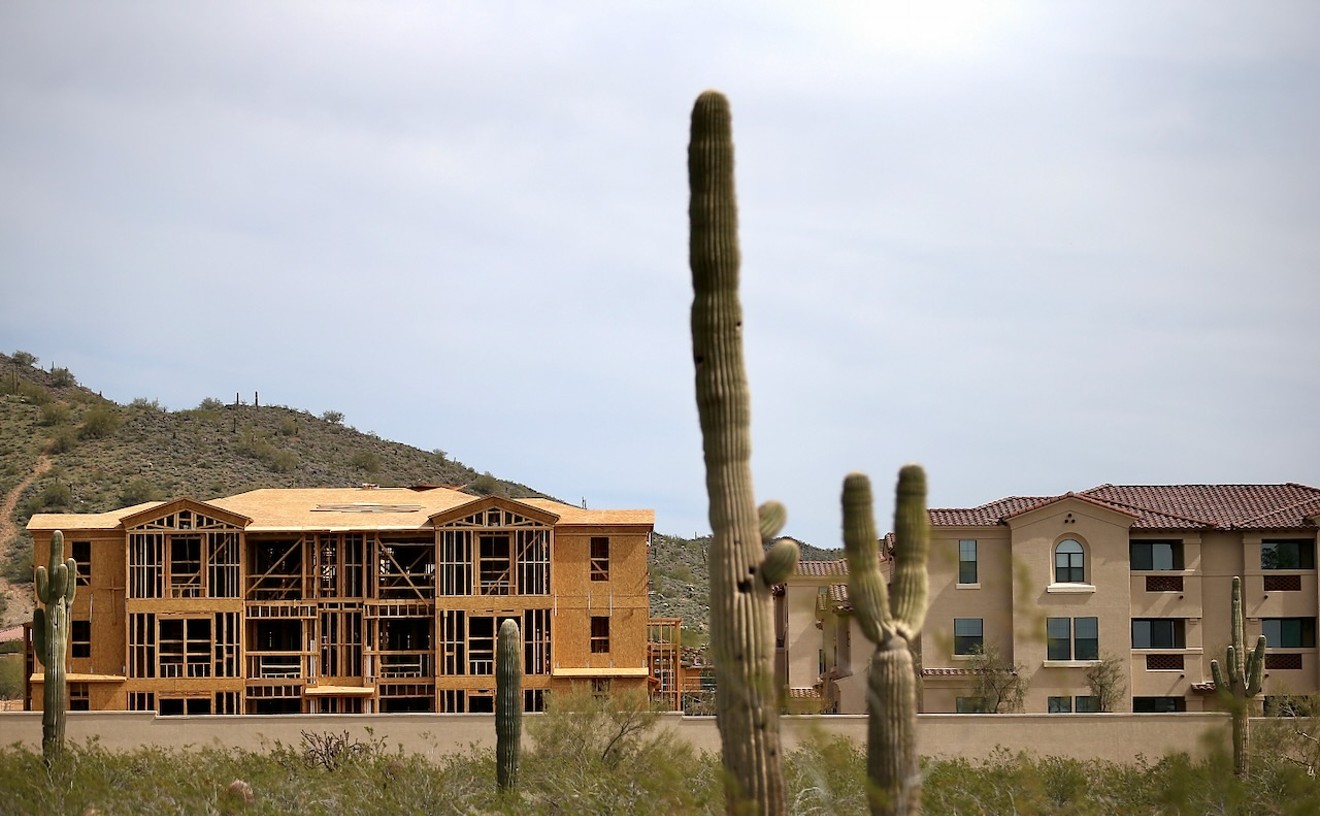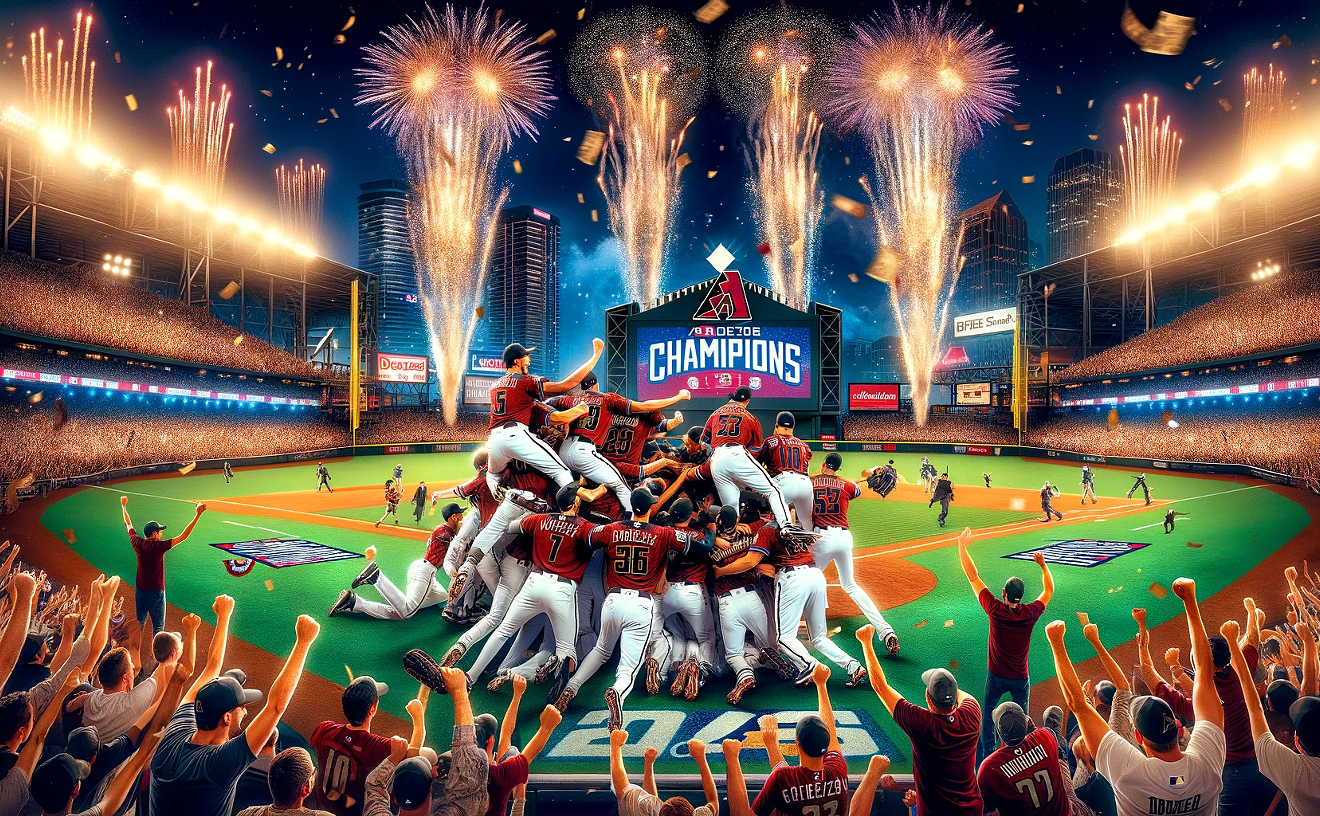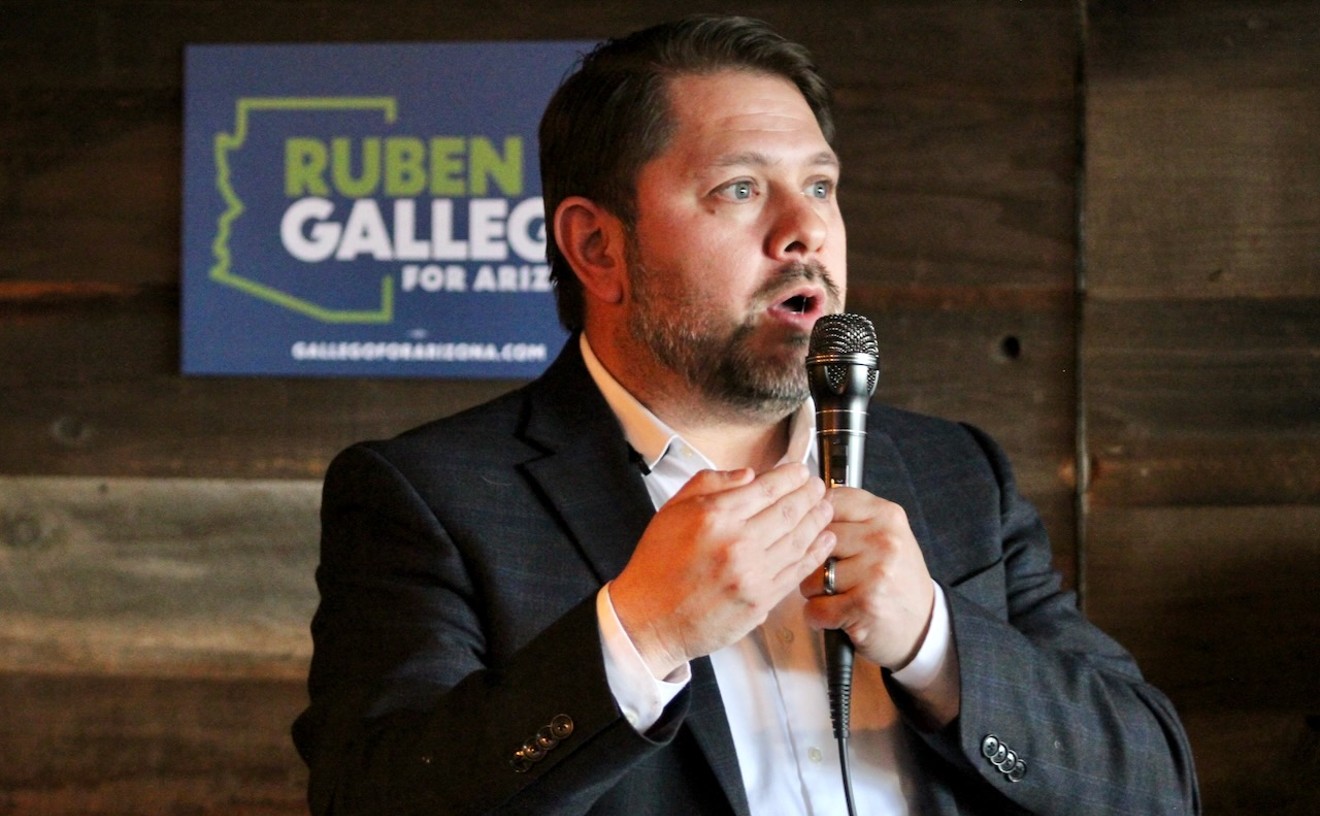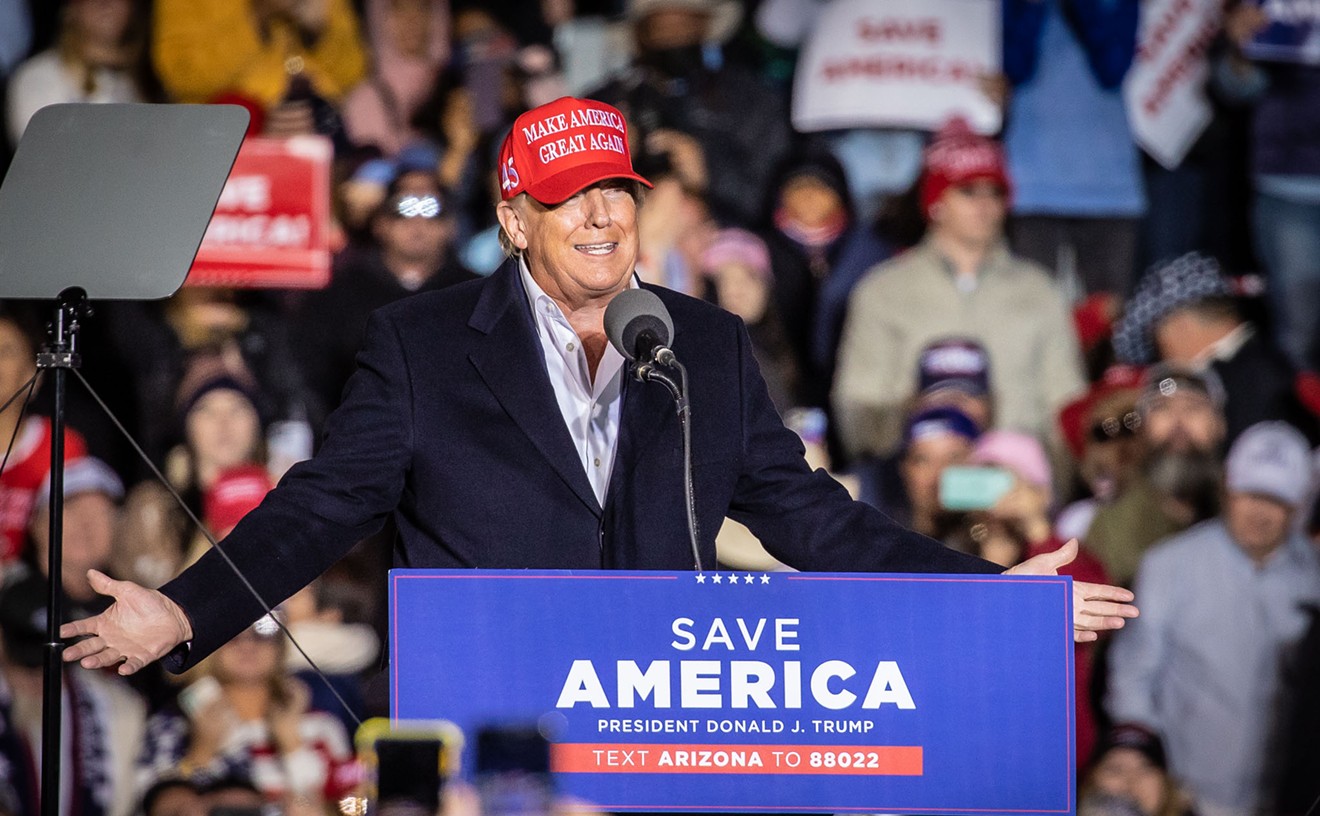Seven died in less than a year--June 1988 to February 1989. The cops figured this could not be written off to mere coincidence. Especially since in so many of the cases death was caused instantaneously by a bullet to the back of the head from a .38-caliber pistol.
At the time of his arrest, Calo was part owner of Michelina's restaurant at 3241 East Shea. Since coming to Phoenix from Italy in 1979, Calo had worked as a carpenter and painter in various Italian restaurants. This included Livia's, Pronto and Maggiore's.
During this time, he became a $2,000-a-week drug runner for Romano Sbrocca, the owner of a fancy Italian restaurant, Ernesto's Back Street at 36th Street and Indian School. Part of his compensation, Calo says, was a BMW provided by Sbrocca.
Calo's wife, Michelina, had been chef at Pronto in 1983 and 1984 when the restaurant won coveted New Times awards for being Phoenix's best continental restaurant. The pair then moved on to the restaurant which still bears the name Michelina's.
This riveting tale came together last week when Superior Court Judge Norman Hall ordered Calo's sworn, 89-page statement about his part in the murders unsealed to the public.
The record had been kept secret by the County Attorney's Office so the agency could attempt to build a case with the information.
Calo, who has pleaded guilty to seven murders, made the confession to assistant county attorney Myrna Parker on July 31 and August 2 in 1992. He wanted to save himself from the death penalty. Currently being held at Arizona State Prison in Florence, Calo will be sentenced by Judge Hall on October 16.
The County Attorney's Office had tried in vain to put the case together in the year the record was sealed, but without success. It has not gathered enough evidence to corroborate Calo's story.
In his confession, Calo named James Majors, 38, who worked with him as a painter and contractor in the restaurants, as the killer.
Majors served two previous prison terms, one for burglary and another for kidnaping. He once escaped from a prison in Indiana. Majors is currently being held in jail in California for three separate killings connected to a drug deal that went bad.
According to police records, Majors--the designated hit man--committed ten murders in a little less than a year's time.
Majors is a fascinating study in sociopathy. A diary maintained by his wife during the period of the killing spree reveals him as a cold-blooded, violent man with no sense of guilt.
Calo says Sbrocca ordered the killings during meetings which were always conducted at Pronto after closing hours.
Here is how Calo described the order for the death of Angelo Desideri.
"Romano said all of it," Calo told assistant county attorney Parker. "It was out of his mouth . . ."
"And what was it that Romano said?" Parker asked.
"Angelo Desideri had to disappear, had to go," Calo said.
"Were those his words, 'had to go'?"
Calo told Parker, ". . . He never said 'kill him,' but that's what he meant."
"Who contacted Jim Majors?"
"I believe I did."
"What did you tell him?" Parker asked.
"I told him there was a job for him, those guys had a job for him," Calo said.
By "those guys," Calo was referring to Sbrocca and two others--one the owner of another Italian restaurant--who have not been charged.
Sbrocca, free on bond while awaiting sentencing on drug charges in federal court, denies Calo's story.
"Calo is a world-class liar," Sbrocca says. "If I were guilty, I would not be sitting around here, would I?"
Calo insists he was only the middleman. He brought the money paid for the killings to Majors, the hit man. He helped set the victims up, but never fired a gun. But Calo does admit he dug graves for two of the victims.
Here are the victims in the order of their deaths:
Angelo Desideri He owned the shopping center at 40th Street and Campbell where the Italian restaurant Pronto is located. Desideri, 59, was a comparatively wealthy man who also ran the business Italian Imports on 16th Street south of Glendale. He was generous. Lorenzo Vivolo, owner of Pronto, reportedly owed Desideri $60,000 at the time of Desideri's death.
Desideri also was the treasurer of the North Italian Social Club located on 16th Street and sometimes kept the club's money in a safe at his home. He was shot to death by Majors and buried in a shallow grave in San Diego on June 5, 1988.
Gaston and Jeannette Couchane They ran the Parisienne Bakery on 24th Street and Oak. Mrs. Couchane was the personnel director of the French Corner restaurant at Central and Camelback. They were murdered in their home on August 24, 1988, because she had overheard Sbrocca in a conversation linking him to the drug business. Calo says the payoff for the killing was $35,000.
John Mancini A regular at Pronto restaurant, he was a drug courier who held out on profits. Mancini was shot to death August 28, 1988. Calo says the payoff for the killing was $25,000.
Barney and Verna Latham They were part owners with Calo in Michelina's restaurant. They were shot to death in their home in the town of Maricopa on December 2, 1988. Calo says Sbrocca was going to lend him $100,000 to buy into the restaurant, then reneged. Calo maintains Sbrocca advised him to get Majors to get rid of the Lathams. The payoff for Calo was that he got control of the restaurant. Majors got all the money and jewelry the Lathams kept in their home.
Robert Reese A drug courier and Majors' best friend was shot to death and buried in a shallow grave near New River on February 18, 1989. Reese, 23, knew about Majors' killing of three people in a drug deal in California the previous month, because he had been present when it took place. Majors feared Reese would talk to the police.
When the cops found the diary Jim Majors' wife had been keeping, they knew they had him.
Jim Majors murdered ten people in little less than a year. But this activity kept him away from home too much. His wife became jealous. She kept a diary.
@rule:
@body:Police solved the case in what now seems a relatively simple manner. Suspecting that Calo was somehow involved, they got a copy of Calo's telephone records.
The records revealed an unusually large number of telephone calls between Calo and Majors had taken place immediately before and after each of the killings.
Police obtained a search warrant for Majors' home. While searching, they found a neatly typed copy of a diary kept by Majors' wife, a legal secretary.
It begins:
"I decided to keep this diary of Jim's 'business' meetings away from the house. I had written them in longhand but decided to type them because my handwriting is sometimes difficult for people to read. I want whoever reads it to be able to decipher everything I have written. This diary begins on June 5th but actually, Jim began his 'business' outside the home before that date."
June 5 was the date that Majors murdered Angelo Desideri after driving him to San Diego.
Here is Mrs. Majors' entry for that date.
"June 5, 1988
"Jim left at 1 p.m. . . . did not return until June 6th at 9 p.m. Claimed he was out of town on a spur of the moment business deal. He returned with $2,500 in cash, at least that is the amount he showed me. He says he drove to wherever he went and flew back.
"The evening after he came back I went out to look in his camper to check it out. I was taking a big chance because he has a violent temper and would have gone through the roof if he caught me. There was a suitcase in the camper with many items in it. Most of them in boxes or cloth bags. I looked in only one box. It was a ring box with a man's heavy gold ring with a flat, solid red kind of stone. It was not a new ring.
"He claims the money for our trip to Las Vegas came from Joe Calo. We went to Vegas and he wanted to go around the casino by himself. He came back in an hour and claimed he had won $2,000. I never know where the money comes from or how much he has.
"On these business forays he wears the same outfit, a black shirt, dark jeans and an old pair of tennis shoes. Of course, this could be a coverup for running with another woman. I'm not sure what's going on. But you can bet your ass I am suspicious as all hell. Is he into something very illegal? Is he involved with the Mafia? I honestly believe that Jim is capable of anything."
Once the police read this portion of the diary, they had reason to believe that the items belonged to Desideri. Later, they learned from Calo how Desideri had died.
Calo told assistant county attorney Parker:
"Majors knew Angelo [Desideri] and he was going to go to his house and ask for a drink of water. The plan was not only to get Angelo but a little black book with all the names in it which he kept for all the drug clients.
"I got to be honest, Miss Parker," Calo said. "I thought it was a joke at first."
Calo says he was outside the Desideri house watching when this took place.
"Then what happened?"
"Majors told me about it later. They got into Angelo's Caddy. They went down to a warehouse on McDowell where they loaded up drugs and went to California to drop them off in San Diego at a hotel. They were delivering the drugs to John Mancini [whom Majors would kill less than three months later].
"He took Angelo and went to buy a pick and shovel. Then he shot Angelo and dug a hole. He took the car back into town and got it washed. Then he bought a can of gasoline and drove the car to a parking lot. He set the car on fire, walked out to the street and hailed a cab to take him to the San Diego airport. Then he flew back to Phoenix.
"Later, he showed me everything he took from Angelo. It was all in his camper, all the jewelry and luggage."
Mrs. Majors' diary for August 18 reads:
"Something must be going on with Joe Calo. I checked out the trunk of Jim's car because I had seen him transferring something from the truck into it. He had a large pick and bag in the trunk. In the bag were a pair of jeans, shirt, sunglasses, belt and two handguns. Oh, yes, there was ammunition. I do know that he said he had bought some 'mankillers' which are hollow point bullets and very lethal."
The murder of Mr. and Mrs. Couchane took place on August 24. Here is the diary entry of Majors' wife for August 25:
"Jim left early morning. When I got home in the evening, I checked the trunk of the Cougar and the gun and bag were gone, as well as the target shells. I called him and he told me he had to go out of town. I have been checking the trunk of the Cougar regularly. This morning the guns were still gone but there was a black bag with coins in it, plus a gold chain, a couple of cameras and a box with gold cuff links in it. There were also two ziplock bags in the trunk. I opened them and inside was white powder. I instantly knew what it was. It looked like coke. There must have been a half pound. We are talking very big money on the street.
"The evidence seems clear to me. I just don't want to believe it. Oh dear God in heaven I don't want to believe it."
@rule:
@body:Later, Calo told assistant county attorney Parker how the Couchanes had been slain by Majors and the reason for the killings.
Mrs. Couchane had been in the kitchen of the Parisienne Bakery one day when Sbrocca and another man had been discussing their drug and murder activities. They were speaking freely because they thought she had left the premises. They did not trust her with this knowledge.
Calo told Parker of a meeting held in Pronto restaurant a week before the killing.
"Why did you have this meeting at Pronto rather than Ernesto's Back Street which Sbrocca owned?" Calo was asked.
"Ernesto's was not a good place. Romano never wanted to talk at Ernesto's," Calo said.
"They had already talked it out before," Calo said. "Nobody liked Majors to come inside Pronto's. We met him outside in the parking lot to give him instructions about killing Jeannette.
"Majors said there was no problem.
"They had to figure out a plan. Majors knew Gaston and Jeannette because he had done work for them. They wanted to kill Jeannette, but realized that Gaston had to go, too, so we had to figure a way to get rid of both of them."
"They were talking about getting rid of Jeannette. Did they ever use the word 'kill'?" Parker asked Calo.
"They never said the word 'kill,'" he answered, "but it's the same thing to me. They told Majors just to go in the house and shoot them. But Majors said he could come up with a better plan."
Several days later, Majors and Calo went to Gaston's office at Scottsdale and Camelback roads. "We took Gaston with us and, after driving a while, Majors pulled a gun and put handcuffs on Gaston.
"We told him we would go to his house and talk to his wife, but that nobody was going to get hurt."
"Did you find out what happened later?" Parker asked.
"Yes," Calo answered, "Majors told me that he shot Gaston once in the head and the bullet came right through his head. Majors took the bullet [with him and later] threw it in the parking lot outside Pronto's at 40th and Campbell."
"How about Jeannette?"
"He shot Jeannette in the head, too, ma'am."
Here is Mrs. Majors' diary for August 30, 1988, less than a week after the murder of the Couchanes:
"I have no proof but all the circumstantial evidence I see points to some very frightening occurrences. What am I in the middle of?" she writes.
"I remember Joe Calo telling me once, 'You don't want to know what Jim is doing.' I am beginning to wonder how much personal danger I am in."
@rule:
@body:John Mancini was the next victim. He was killed on August 28, four days after the Couchanes.
Calo explained to Parker that Mancini owed money to Sbrocca and was "creating problems."
"What was he doing wrong?" Calo was asked.
"He was talking a little bit. He was not doing his job right. He was not delivering on time. In fact, he was never on time. And I guess he was stealing from them. That's what I understand."
"What kind of work did he do for Romano?" Parker asked.
Calo seemed surprised by the question.
"He delivered drugs, ma'am."
"Who made the decision to kill Mancini?"
"We were driving in the car to a place called Bourbon Street. Romano Sbrocca said he was tired of what was going on with Mancini. Mancini was bringing money back from California, and it was agreed Mancini would call me at Michelina's from the airport and I would pick him up."
Instead, Majors was sent to the airport.
They had told Mancini he was in trouble, but had agreed to give him one more chance. This was a lie; they had already decided to kill him.
"They were laughing so hard that I lied to him. I didn't like John, anyway," Calo said.
Majors picked up Mancini and brought him back to Michelina's.
Majors, Calo and Mancini went for a drive. Calo was driving with Mancini in the front seat next to him. Majors was in the back.
Majors struck Mancini on the head and then put handcuffs on him.
"We took Carefree Highway and went towards Horseshoe Lake," Calo said. "When we got there, a hole was already dug."
"Who dug the hole?" Parker asked.
"I did, ma'am," Calo said.
"How much before?"
"Maybe a week before. I never thought he was going to kill him. Majors shot one shot and didn't hit him.
"Maybe five seconds later, he shot three more times and Mancini fell down and pulled the antenna off the car. The first thing Majors did was to pick up all the shells from the bullets. I pulled the body of Mancini in the hole.
"I know he was going to die. But it really surprised me because he killed him cold-blooded, right there."
"What did you receive of value from the death of John Mancini?" Parker asked.
"Nothing, ma'am, nothing. Just two thousand dollars a week."
"That was for your participation in drugs, correct?"
"That's correct, ma'am," Calo said.
@rule:
@body:The murder of the Lathams was the most difficult for Calo, he told police. The Lathams had been his friends. They had brought him into Michelina's restaurant.
In their 60s, they were under the impression that Calo was going to buy the restaurant from them for $100,000.
Calo says Sbrocca promised to give him the money. But Sbrocca told him to get Majors to kill them and take the restaurant. And that's the way it worked out.
The Lathams were killed on December 2, set up by Calo, who told them he was going to bring $100,000 to their house to pay for the restaurant. Instead, Majors was sent to their home. Calo had driven Majors to the site the night before so he would know where he had to go.
"He was going to rob them and scare them off," Calo told Parker.
"And did you know that he had a gun with him when he went down there?" Parker asked.
"Oh, yes, ma'am, he always had three guns with him."
Majors killed the Lathams in cold blood. But Mrs. Latham managed to leave a message that exposed her killers.
On a blood-soaked magazine later found under her body, Mrs. Latham had written: "Joe Calo had us killed. Get Joe Calo. His painter friend did it."
Majors, in addition to being a hit man, also was the man who did all of Calo's restaurant painting.
At just about this time, Majors' wife made the following entry in her diary:
"I think it is totally ridiculous. Jim is just trying to be a copy of Joe Calo. He even wants to drive a car like Joe drives. I wonder when he will dye his hair black, develop an accent and go to Italy . . . Joe Calo has become the center of his existence . . . all I have gotten in the eight years of this marriage is a knife in the back.










